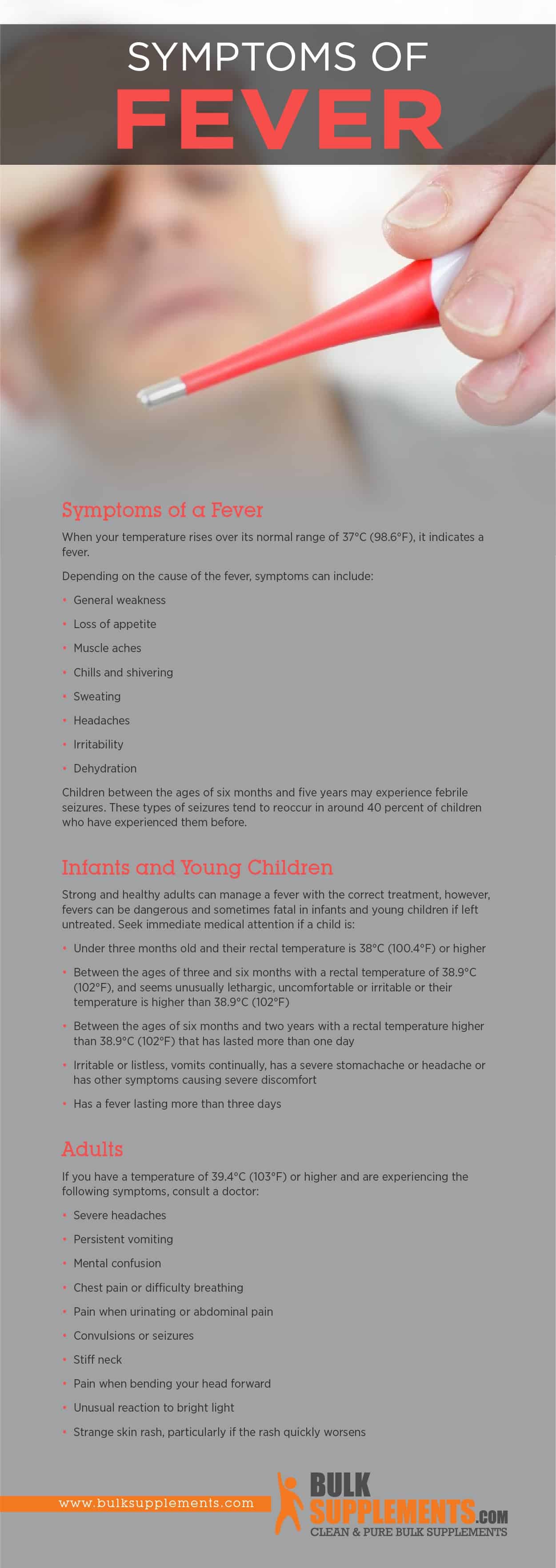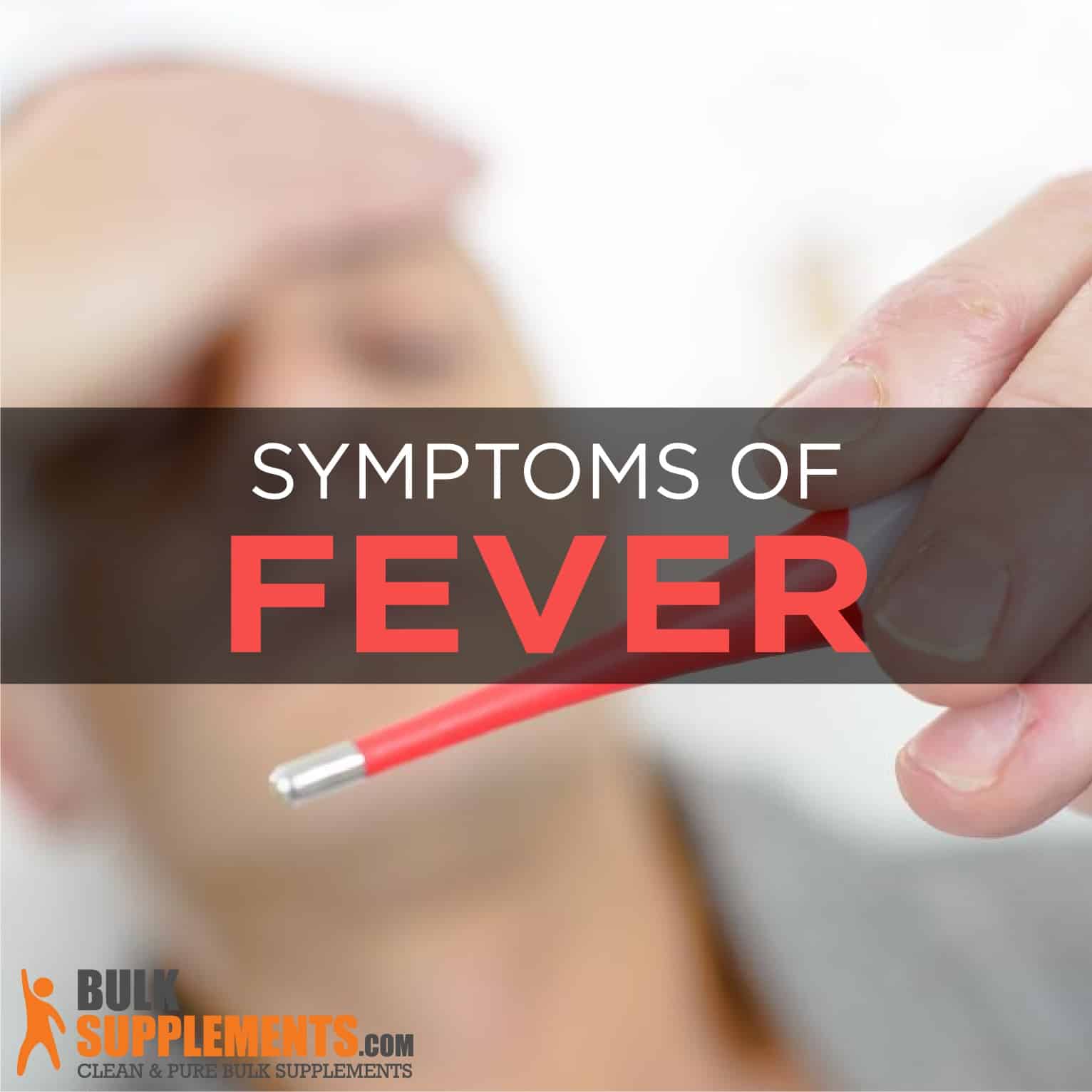What is a Fever?
A fever is a higher-than-normal temperature, also known as pyrexia or hyperthermia. When you have a high fever, your first thought maybe that you have COVID-19, but that is not always the case.
No matter what causes your fever, it’s essential to isolate yourself and behave as if you have COVID-19. It’s best to isolate yourself whenever you have a fever because, most likely, you are contagious even if you don’t have COVID-19. You don’t want to give anyone else your germs — or make them sick, too.
Fever is usually a symptom of a medical condition, such as an infection or illness. The average normal temperature of the body is 37°C (98.6°F) but can range between 36.4°C (97.5°F) and 37.5°C (99.5°F), depending on the person and several external factors. According to most doctors, a temperature above 38°C (100.4°F) means a fever. (x)
Average body temperature may vary with age, activity level, overall health, time of day, and the type of clothing worn. Body temperature is usually at its highest in the late afternoon or early evening and its lowest between midnight and early morning.
Healthcare professionals rarely consider a fever severe. However, symptoms like hyperthermia — abnormally high body temperature — may cause dangerous spikes in body temperature as the body cannot regulate itself. (x)
A fever is taken very seriously in infants and young children, as it can be fatal if left untreated. Children may show specific symptoms, like a dry mouth, lack of appetite, fussiness, severe headaches, vomiting, diarrhea and a sore throat. If these symptoms are prevalent in your young children, consult a doctor immediately. (x)
Causes of Fever
Almost all infections may cause a fever, including: (x)
- Respiratory tract infections like colds or flu, sore throats, sinus infections, ear infections, bronchitis, mononucleosis, tuberculosis and pneumonia
- Urinary tract infections
- Bacterial gastroenteritis and viral gastroenteritis
- Bone infections (osteomyelitis), cellulitis or skin infections, appendicitis and meningitis
- Joint inflammation
- Allergic reaction to medications or vaccines
- Gastrointestinal diseases
- Some tumors
- Immunizations such as children can have a mild fever for up to two days after certain vaccinations.
- Teething can cause a slight increase in an infant’s temperature, but not generally above 37.8°C (100°F).
Inflammatory or Autoimmune Conditions
Inflammatory or autoimmune conditions can also cause fevers, such as Crohn’s disease and ulcerative colitis; periarteritis nodosa or vasculitis; arthritis and connective tissue conditions, such as systemic lupus erythematosus and rheumatoid arthritis.
Cancer
Other diseases that cause fever include leukemia, Hodgkin lymphoma and non-Hodgkin lymphoma. (x) (x)
Reaction to Medications
Fevers may also be a sign of thrombophlebitis or blood clots and react to some antibiotics, seizure medicines and antihistamines.
Infections in Children
The leading cause of fever in children is infections. Most infections are viral and include upper respiratory infections, colds and common infectious childhood illnesses, like chickenpox. Incidentally, chickenpox can cause shingles in adults. (x)
Some bacterial infections may require special treatment. They include some throat and ear infections, blood infections, urinary tract infections, meningitis and pneumonia. The bacterial infection known as streptococcus can also cause a severe sore throat along with a fever. Moreover, physicians should observe this infection as it may lead to heart damage or rheumatic fever. (x)
Symptoms of a Fever
You can easily spot a fever with these indications. When your temperature rises over its normal range of 37°C (98.6°F), it shows a fever. Depending on the cause of the fever, symptoms can include:
- General weakness
- Loss of appetite
- Muscle aches
- Chills and shivering
- Sweating
- Headaches
- Irritability
- Dehydration
Febrile Seizures in Children
Febrile seizures and convulsions can occur with your children between the ages of six months and five years, which happens because of a high fever. These types of episodes tend to recur in around 40 percent of children who have experienced them before. (x)
Infants and Young Children
Strong and healthy adults can manage a fever with the correct treatment. However, fevers can be dangerous and sometimes fatal in infants and young children if left untreated. Seek immediate medical attention if a child is:
- Under three months old and their rectal temperature is 38°C (100.4°F) or higher
- Between the ages of three and six months with a rectal temperature of 38.9°C (102°F), and seems unusually lethargic, uncomfortable or irritable or their temperature is higher than 38.9°C (102°F)
- Between the ages of six months and two years with a rectal temperature higher than 38.9°C (102°F) that has lasted more than one day
- Irritable or listless vomits continually, has a severe stomach ache or headache or has other symptoms causing severe discomfort
- Has a fever lasting more than three days
Adults With Fever
If you have a temperature of 39.4°C (103°F) or higher and are experiencing the following symptoms, consult a doctor:
- Severe headaches
- Persistent vomiting
- Mental confusion
- Chest pain or difficulty breathing
- Pain when urinating or abdominal pain
- Convulsions or seizures
- Stiff neck
- Pain when bending your head forward
- Unusual reaction to bright light
- Strange skin rash, particularly if the rash quickly worsens
Treatment for Fever
Your doctor may not recommend any treatment to bring the body temperature down for mild fever as a slight fever can sometimes help kill the microbes making you ill.

Over the Counter Medications
Over-the-counter medicine like acetaminophen (Tylenol) or ibuprofen (Motrin IB, Advil) may help with a mild fever. Of course, always adhere to the recommended dosage as per the label instructions if you are self-medicating or as the doctor prescribes.
Take care to avoid overdosing as long-term use or high doses of acetaminophen or ibuprofen may cause kidney or liver damage. Overdoses of such medications may also be fatal. (x) Avoid giving aspirin to children as it can cause a rare but sometimes lethal disorder called Reye’s syndrome. (x)
Prescription Medications
Your doctor may prescribe antibiotics for a severe fever, particularly if a doctor suspects a bacterial infection, like strep throat or pneumonia. Antibiotics don’t treat viral illnesses, but some antiviral drugs will treat specific viral ailments. Drink plenty of water and rest.
Treatment of Infants
Babies, particularly those under 28 days old, most likely, doctors have them hospitalized for treatment of fever as it may be a sign of a severe infection that needs intravenous medication and 24/7 monitoring.
Lifestyle Changes and Home Remedies
When suffering from a fever, try the following remedies for comfort and relief:
- Drink Lots of Fluids
Fever may cause dehydration, so drink plenty of water, juice and broth. For children under the age of one, an oral rehydration solution like Pedialyte helps to replenish lost electrolytes and minerals.
- Eat Bland, Mild Foods
When suffering from a fever, you tend to lose your appetite. Eating bland, mild foods can be beneficial, mainly if vomiting occurs. These may include simple broth, chicken soup and oatmeal. Children will enjoy fruit juice popsicles, which will help replenish lost sugars and vitamins. Try to eat unrefined, low-sugar foods. (x)
- Get Ample Rest
Plenty of rest and sleep will help the body heal faster. In fact, sleep triggers the secretion of hormones in the brain that promote the growth of new tissue and produces new white blood cells that attack bacteria and viruses, enabling the body to defend and heal itself. Try to get at least eight hours of sleep each night.
- Stay Cool
Help keep the body temperature down by staying cool. Place a wet cloth on your forehead, sleep with a light sheet or blanket and keep the room temperature cool.
Supplements for Fever
Using supplements will help your body manage a fever while strengthening and supporting your immune system to heal faster. Before starting any new supplement, confirm with your healthcare provider. Some to help treat your fever may include:
- NAC (N-Acetyl L-Cysteine)
This amino acid synthesizes glutathione, a vital antioxidant. Not only does it support digestion, but it also boosts healthy liver function and maintains healthy levels of blood sugar. Research, in general, offers evidence of treating respiratory infections with NAC based on its antibacterial components. (x) The recommended dosage of N-acetyl L-cysteine is 600 milligrams, three times daily or as instructed by a doctor.
- White Willow Bark Extract Powder
White willow bark helps to relieve pain caused by back problems, headaches, and joint inflammation. The recommended dosage for white willow bark extract is 400-1,600 milligrams daily.
- Vitamin C Powder
Vitamin C is a powerful antioxidant for fighting viral infections. Vitamin C deficiency also causes infections which lead to fevers. Giving you even more reasons to make it one of your daily supplements. (x) The recommended dosage is around 1,000 milligrams daily.
- Andrographis Powder
Andrographis helps boost immune function and ease problems linked to the common cold. The recommended dosage is 800 milligrams of powder a day, or as instructed by your doctor (x).
- Elderberry Extract Powder
This supplement promotes a healthy digestive system and enhances urinary tract health. It contains many nutrients like vitamin C and A, as well as beneficial anthocyanins. Take 1,000-3,000 milligrams of elderberry extract powder per day or as instructed by your physician.
- Echinacea Extract Powder
For centuries, echinacea extract powder acts as an anti-inflammatory and helps boost immune health. (x) The daily recommended dosage is 450 milligrams, once or twice a day, or as instructed by your doctor.
- Butterbur Extract Powder
Butterbur extract may help your pain, headache and allergy relief. Take 150 milligrams daily with plenty of water. The recommendation is to take the extract for three to four months before gradually reducing the dose to experience maximum benefits.
- Chamomile Extract
Chamomile has calming and soothing effects. Research shows when used orally and topically, chamomile has anti-inflammatory, antihistamine, and anti-anxiety effects. (x) Take 800 milligrams of chamomile extract powder with water once or twice per day or as instructed by your physician.
Where to Buy Supplements for a Fever?
You can purchase these supplements for a Fever at BulkSupplements.com. The company is an industry-leading manufacturer and distributor of pure dietary supplements.
BulkSupplements.com is not just a consumer brand. It also supplies pure ingredients to other food and supplement brands to make their products. All products at BulkSupplements.com are manufactured and tested according to current and proper manufacturing practices.
Are you interested in trying any of these supplements mentioned in this article as a possible solution to helping you with your fever? Contact BulkSupplements.com to place an order today.
The Bottom Line
The medical industry calls it a fever if you have a high temperature, pyrexia or hyperthermia. It refers to a higher-than-average body temperature and can affect both adults and children.
A temporary rise in body temperature may help your body counteract illness. However, a severe fever may show a more serious medical condition, and medical consultation is necessary to rule out any severe health concerns.
A fever is usually the symptom or by-product of an underlying medical condition, such as an infection. According to most doctors, a body temperature that’s higher than 38°C (100.4°F) is a fever sign. It’s time to isolate or quarantine yourself, so you don’t get others sick.
Fever symptoms include headaches, chills and shivering followed by sweating, weakness, loss of appetite, muscle aches and pains and dehydration.
However, you can treat your fever by drinking plenty of water, getting lots of rest, staying cool and hydrated, eating soft and bland foods and taking over the counter or prescribed medicines as recommended by your doctor. Some prefer to treat their symptoms naturally with supplements since drugs are hard on your kidneys and liver.
These statements have not been evaluated by the Food and Drug Administration. These products are not intended to diagnose, treat, cure or prevent any disease.


